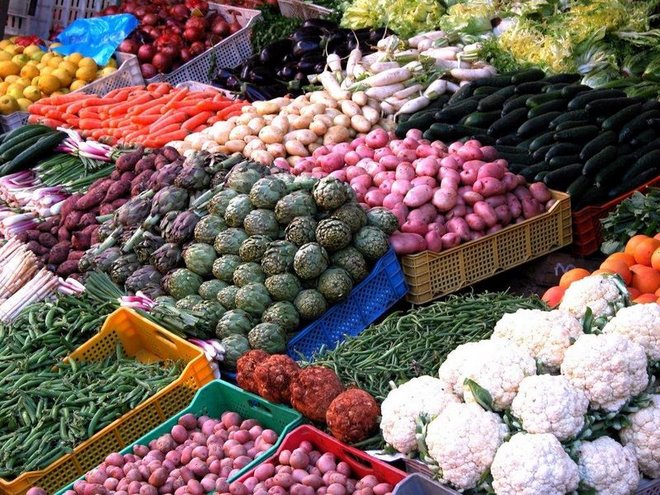I have recently written a guest post on finding affordable organic vegetables for a fairly famous blogger. He emailed yesterday to say he was considering taking out, from my guest post, what he considered to be political statements about food--references to industrial agriculture, the environmental aspects of food choices, etc. It wasn't that he disagreed with me; he just wanted to be sure I realized what I was saying might be controversial. I replied that I consider all food choices to be political: they're either political because you are engaged in how the production of food works, and you want to have an impact on that; or they are political because you are ignorant of how food is produced, transported, and sold--and you are making a statement that you are not interested in these issues by your choices.
I was very ignorant of why food choices mattered until I developed a hormone-linked cancer five years ago. Suddenly, from my research into the issues related to my cancer, I could see why the food I picked mattered in a very personal way: cattle that have been pumped full of extra bovine growth hormone produce milk and beef loaded with bovine growth hormone. Milk and beef loaded with bovine growth hormone jack up estrogen in women. Jacked-up estrogen makes you more likely to develop hormone-linked cancer. Moreover, there is some evidence that pesticides--which are mostly found in our fruits and vegetables that have been treated, but which are also found in animals who have consumed them and in our water supply--mimic estrogen in the body because of their similar chemical structure. Pesticides can possibly bump up cancer risk as well, then.
By then I was on a path down the rabbit hole, where an intertwined world of cause-and-effect opened up to me. Pesticides--and they are used in enormous amounts in factory farming, which is what most farming in the US is now--can make us sick even if they don't mimic estrogen. Just as the bugs who feast on pesticides get sick, humans can, too. The run-off into our water supply (a supply that is finite) ruins clean water. The chemicals from pesticides, run-off from farms, run-off from factories in the US: all of that is filtered through fish. When we eat fish, we eat that run-off as well, hence the warnings about PCB's and mercury in fish these days.
When we grocery shop at a regular store, we buy food that has traveled, on average, 1500 miles to reach us. That's 1500 miles of gasoline--with all its pollution it spews--used up for each kiwi and broccoli stalk we consume. Meanwhile, the tactics used by the factory farms and the out-of-date subsidies provided by government heave created enormous pollution, waste, and mis-production of food before it even reaches us.
While at the store, we get plastic bags to throw away later. When we eat prepackaged meals, we toss the containers. When we are cooking, we use paper towels and plastic baggies and throw them away. When we eat dinner, we use paper napkins and throw them away. (When we clean up from dinner, we also wash our plates with chemicals that go into the water supply.) All of that adds up. There are over 6 billion people in the world and over 250 million people in the US. Where is all that garbage going to go? Atlanta once wanted to put a giant dump next to the small town where I grew up; the town wouldn't let them. But the trash of Atlanta's 3 million residents has to go somewhere. Where?
Then we have how the animals we eat are treated. I am not an 'animal rights activist,' per se, but I do believe that if you are going to eat meat, you take a responsible approach to the treatment of the animals that become that meat. Even if you believe the biblical Genesis statement that man is given 'dominion' over the animals, man is still intended to care for those animals. If an animal is giving up its life to feed you, the least you can do is make sure the life that animal has before that time is an acceptable one. And the way animals are raised on many farms (and these are not, for the most part, family farms) is reprehensible: chickens fed animal products (when they are herbivores by nature), stuffed into tiny crates by the thousands, with dead ones left to rot and explode; calves stuffed constantly with milk and unable to move freely before they become veal; cows butchered into pieces before they are even dead; pigs . . . well, if you'd like, you can read the recent Rolling Stone article that made my devout bacon-eating husband decide he is no longer supporting the pork industry with his consumption. This is not crazy left-wing stuff; it's the way animals are raised all over our country--the Perdue chickens, the McDonald's cows, the Smithfield Farms pigs. If you don't believe me, you can find videos on the web of what those farms are like, or you can read the book Fast Food Nation, which was possibly the most eye-opening read of my life.
We have to come together as not just a nation, but also as a world, to face the problems that the multiplication of humanity--combined with our rampant use of chemicals, consumption of finite, polluting energy sources such as oil, and infinite production of junky plastic products--are creating. People in other countries do take different steps: just try getting away with NOT recycling in Switzerland; check out the small, reusable cloths women carry in Japan to wipe their hands after washing them; visit a market in some parts of Australia and watch the reusable shopping bags that are in vogue there. How we live matters. Our choices--when we vote with our pocketbooks, when we use an alternative--matter.
I don't mean to imply that I make perfect choices or never waste anything, because I do. I'm working on it, though. You'll notice in my food pictures we use cloth napkins. Yes, it uses water to keep cloth napkins clean, but it uses a lot less water and everything else to use cloth napkins than it does to keep using up paper ones. I've switched most of my home cleaning products--dish soap, clothes soap, tub scrubber, etc.--to ones that don't help destroy our water supply. Yes, they are more expensive, and some require more 'elbow grease' to work. I consider it worthwhile for my future grandchildren. I consciously make an effort to reduce (do I really need this? how much of this?), reuse (what other incarnation can this have in my life?), and then recycle. This month, I'm purchasing a diva cup to use instead of pads and tampons. (My friends who are using them seriously rave about them.) I walk and use public transportation when I can; we chose our current apartment based on its proximity to my husband's school and the variety of night-life we can hit by walking or using MARTA (our public trains).
My husband and I buy locally sourced, organic food whenever possible; you can find local food almost anywhere in the US, and it's way cheaper than buying similar items from the grocery store. I supplement with local or organic food from nearby stores when I need to. In doing all of that, we support small family farms. We make sure that heirloom vegetables--vegetables that haved adapted to survive over the course of their development, not altered by scientists--stay in use. We decrease the gas consumption (with all its pollution) of our food traveling a long way to us. And we get food that is of higher quality--because it's fresher when it comes to us 1-2 days out of the field. (Yes, it has meant learning to eat foods I'd never had before. But that's actually been great.)
Will I ever be perfect at all of this? No, I won't. But my choices do matter, and they matter even more if I tell you why I made them, if I get you thinking about these topics, too.
I'm posting about this because I think it's imperative that we all think about what we want the world to be like for our children, and our children's children . . . children the world over. I think we need to think about what our values are and whether we are living up to them. I think we should question the role that ads and corporations play in our lives, how they affect what we think we want or need. (Think they haven't affected food? Check out this recent NY Times article--it's fascinating.) I am writing this post, despite some flak I might get for it, because I think these subjects are too important, and too involved in our day-to-day lives, for us not to think about them and act on our thoughts.
Thursday, February 1, 2007
Subscribe to:
Post Comments (Atom)




6 comments:
YES! YES! YES! Food is politics I am so glad others see this too. :) VERY well written!
Lol, csmc, thanks.
Snackie, organic definitely is better for you. People who are unfamiliar with it think it sounds so strange, but it's the way food was grown until recently!
I believe that, in the end, the blogger left in part of my political stuff and pulled part of it out. Mostly, it seems, he wanted me to be aware of the firestorm that might occur with the post, and that really doesn't bother me. I don't ever want people to think I'm judging them about food, 'cause I'm not, but I also don't want to shy away from an important topic where people need to have developed opinions they have thought out.
Fantastic post! I'm learning to buy organic more -can I say I bought some organic orange juice the other day (it was pretty expensive) but I couldn't get over how great it tasted??!!
I couldn't agree more, and your post makes me think I should write more about my own experiences with food and politics. I was raised between two different environments — the pre-packaged, processed foods of my mother's laziness and the organic, home-grown, fresh vegetables and fruits from my grandparents' farm. I didn't always agree with my grandparents' social or financial politics, but I learned something potent from their stance on food and sustenance. I know which food I preferred, and the day I can find a reasonable way to grow my own food while still living in a downtown environment, I'll be all over it. It's definitely a fantasy I have, and a life I am slowly working towards. (For instance, I currently have worm composters, even though I don't currently have a garden.)
Meta, I had the same experience the first time I tried organic milk. "This is skim milk?? But it tastes so good!"
Mal, I don't think it's entirely laziness that leads us to prepackaged foods; a lot of us don't have the skills and think homemade meals have to be complex. But they really don't--most of mine are just "here are some veggies with herbs and cheese thrown in." I agree with you that eating fresh food is very preferable. Some people do raised-bed urban gardens, which interest me, but we don't have the space! I also love the new movement towards having lawns that are not just grass but have fruit trees and berry bushes and such in them.
Great post, and so true in so many ways! No one is ever perfect... we have to make our choices based on our own conscience. Sometimes I make choices I don't like--I buy non-leather shoes that were probably made in sweatshops, for example. But it's a choice I can live with for now, because if I deprived myself of fashion, I'd probably end up thinking my values were "too hard." Anyway... I'm rambling, but you get the idea...
Post a Comment